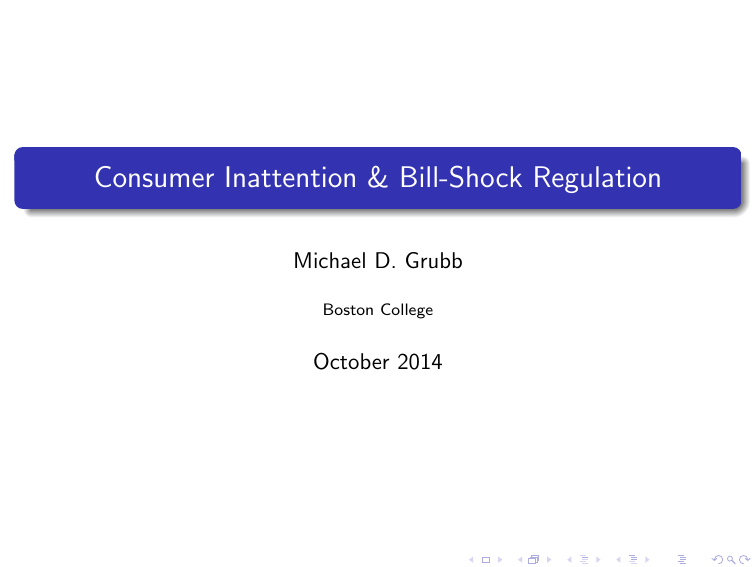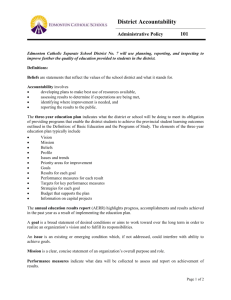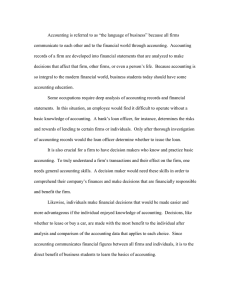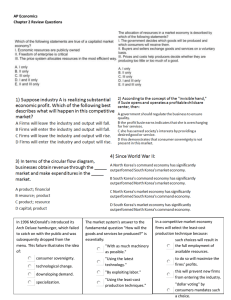Consumer Inattention & Bill-Shock Regulation Michael D. Grubb October 2014 Boston College

Consumer Inattention & Bill-Shock Regulation
Michael D. Grubb
Boston College
October 2014
Motivation
Firms frequently offer consumers contracts with “free” units and steep penalties for excessive usage
Cell phone service: Overages over 20% of US revenues 2003
Checking accounts: 2013 overdraft fees: US
$
32 Bn & UK
£
2.9 Bn,
Checking accounts: including
£
0.4 Bn paid item charges.
Credit cards
Often penalties are a surprise, causing bill shock.
Motivation
Firms frequently offer consumers contracts with “free” units and steep penalties for excessive usage
Cell phone service: Overages over 20% of US revenues 2003
Checking accounts: 2013 overdraft fees: US
$
32 Bn & UK
£
2.9 Bn,
Checking accounts: including
£
0.4 Bn paid item charges.
Credit cards
Often penalties are a surprise, causing bill shock.
Research Question
Firms often choose not to disclose whether or not a penalty fee is applicable at the point of sale.
Cell phone screen could flash “overage rate applies”
Debit card terminal could ask “overdraft applies: continue? yes/no”
Question : Would it be a good idea to require such disclosure?
Recent Regulatory Attention
Far too many Americans know what it’s like to open up their cell-phone bill and be shocked by hundreds or even thousands of dollars in unexpected fees and charges. But we can put an end to that with a simple step: an alert warning consumers that they’re about to hit their limit before fees and charges add up.
President Barack Obama, October 17 th
, 2011.
Recent Regulatory Attention
US cellphones : Since 2013, agreement with FCC requires US carriers to alert consumers when they approach and exceed usage allowances
(voice, text, data)
US Overdraft fees : Effective July 1st, 2010 the Fed requires opt-in for overdraft protection on ATM and debit card transactions.
The CFPB wants to do more (proposed “penalty fee box”)
UK Overdraft fees : In 2011 HMT Consumer Credit and Personal
Insolvency Review, major banks agreed to provide optional text/e-mail low balance alerts.
Today’s Talk
Theory
“Consumer Inattention and Bill-Shock Regulation”,
Review of Economic Studies 2014
“Overconfident Consumers in the Marketplace”
Draft in preparation for Journal of Economic Perspectives .
Applications
“Cellular Service Demand: Biased Beliefs, Learning, and Bill Shock”, with Matthew Osborne American Economic Review forthcoming.
Work in progress with Matthew Osborne: low balance alerts for checking accounts.
Theory Model (Grubb 2014)
1
Time t = 0: Hotelling duopolists offer contracts & risk neutral consumers choose:
P = M + p
1 q
1
+ p
2 q
2
+ ˆ · q
1 q
2
2
Time t ∈ { 1 , 2 } : Consumer makes a buy-or-not-buy decision, choosing quantity q t
∈ { 0 , 1 } given private value v t
∼ F ( v ).
3
ˆ > 0 → penalty fee
ˆ < 0 → loyalty discount
Rational Inattention
Between periods 1 & 2, consumer may pay cost k to look up past usage q
1
(to be attentive).
If choose to be inattentive: cannot recall q
1 at time 2 cannot condition time 2 purchase on past usage q
1 can only respond to E [ MP ]
Sophisticated: anticipates future inattention.
Naive: Believes k = 0, so fails to anticipate own inattention.
Rational Inattention
Between periods 1 & 2, consumer may pay cost k to look up past usage q
1
(to be attentive).
If choose to be inattentive: cannot recall q
1 at time 2 cannot condition time 2 purchase on past usage q
1 can only respond to E [ MP ]
Sophisticated: anticipates future inattention.
Naive: Believes k = 0, so fails to anticipate own inattention.
Bill-Shock Regulation(BSR)
Bill-Shock Regulation (BSR):
Firms must alert consumers at time 2 if ˆ applies.
Equivalence Result for Sophisticates
Proposition
If consumers are sophisticated then inattention and BSR do not affect welfare, profits, consumer surplus, allocations, or market shares.
Does not explain why firms charge surprise penalty fees or lobby against bill-shock regulation.
Equivalence Result for Sophisticates
Proposition
If consumers are sophisticated then inattention and BSR do not affect welfare, profits, consumer surplus, allocations, or market shares.
Does not explain why firms charge surprise penalty fees or lobby against bill-shock regulation.
Equilibrium with Naive Consumers
Naive Result
Two possible outcomes: a
1
Firms charge a surprise penalty fee ( ˆ > 0 ) & consumers underestimate chance of paying it
2 Firms offer a surprise loyalty discount ( ˆ < 0 ) & consumers overestimate chance of collecting it
In either case, consumers are inattentive & overvalue contracts by k.
a
Equally profitable but # 1 more robust to arbitrage by attentive consumers.
Welfare consequences in Hotelling duopoly?
None, because ρ = 1 &
D
= 0.
Welfare Consequences of Naive Inattention
Supply and Demand for Contracts Delivering n
Un
Perceived price decrease
True price increase
1 k = contract overvaluation
Bill ‐ Shock Regulation will lower contract price by: ρ ) k
Q
1
Consequences depend on pass-through rate & elasticity
BSR: price down (1 − ρ ) k ; perceived price up ρ k
BSR Benefits:
D
= 0
D
< 0
ρ = 1 no one marginal cons.
ρ = 0 infra-marginal cons.
Overdraft fees: Jamie Dimon, CEO of JPMorgan Chase says ρ = 1:
If you’re a restaurant and you can’t charge for the soda, you’re going to charge more for the burger. Over time, it will all be repriced into the business.
Credit cards: Agarwal, Chomsisengphet, Mahoney, & Stroebel
(forthcoming) argue ρ ≈ 0 given Ausubel (1999) and their estimate that 2009 CARD act fee reductions save consumers
$
13Bn/yr.
Cellphone service : Genakos & Valletti (2011) find ρ < 1 but close to 1 in EU. Grubb & Osborne (forthcoming) est.
ρ ≈ 1 in US.
Consequences depend on pass-through rate & elasticity
BSR: price down (1 − ρ ) k ; perceived price up ρ k
BSR Benefits:
D
= 0
D
< 0
ρ = 1 no one marginal cons.
ρ = 0 infra-marginal cons.
Overdraft fees: Jamie Dimon, CEO of JPMorgan Chase says ρ = 1:
If you’re a restaurant and you can’t charge for the soda, you’re going to charge more for the burger. Over time, it will all be repriced into the business.
Credit cards: Agarwal, Chomsisengphet, Mahoney, & Stroebel
(forthcoming) argue ρ ≈ 0 given Ausubel (1999) and their estimate that 2009 CARD act fee reductions save consumers
$
13Bn/yr.
Cellphone service : Genakos & Valletti (2011) find ρ < 1 but close to 1 in EU. Grubb & Osborne (forthcoming) est.
ρ ≈ 1 in US.
Consequences depend on pass-through rate & elasticity
BSR: price down (1 − ρ ) k ; perceived price up ρ k
BSR Benefits:
D
= 0
D
< 0
ρ = 1 no one marginal cons.
ρ = 0 infra-marginal cons.
Overdraft fees: Jamie Dimon, CEO of JPMorgan Chase says ρ = 1:
If you’re a restaurant and you can’t charge for the soda, you’re going to charge more for the burger. Over time, it will all be repriced into the business.
Credit cards: Agarwal, Chomsisengphet, Mahoney, & Stroebel
(forthcoming) argue ρ ≈ 0 given Ausubel (1999) and their estimate that 2009 CARD act fee reductions save consumers
$
13Bn/yr.
Cellphone service : Genakos & Valletti (2011) find ρ < 1 but close to 1 in EU. Grubb & Osborne (forthcoming) est.
ρ ≈ 1 in US.
Consequences depend on pass-through rate & elasticity
BSR: price down (1 − ρ ) k ; perceived price up ρ k
BSR Benefits:
D
= 0
D
< 0
ρ = 1 no one marginal cons.
ρ = 0 infra-marginal cons.
Overdraft fees: Jamie Dimon, CEO of JPMorgan Chase says ρ = 1:
If you’re a restaurant and you can’t charge for the soda, you’re going to charge more for the burger. Over time, it will all be repriced into the business.
Credit cards: Agarwal, Chomsisengphet, Mahoney, & Stroebel
(forthcoming) argue ρ ≈ 0 given Ausubel (1999) and their estimate that 2009 CARD act fee reductions save consumers
$
13Bn/yr.
Cellphone service : Genakos & Valletti (2011) find ρ < 1 but close to 1 in EU. Grubb & Osborne (forthcoming) est.
ρ ≈ 1 in US.
Mix of Attentive & Naively Inattentive
Proposition
Bill-shock regulation ends cross-subsidies, helping the naive at the expense of the attentive.
Price Discrimination Between Sophisticates
Suppose that
All consumers are sophisticated
Ex ante there are types with low ( v t
Firms want to price discriminate
∼ F
L
) and high ( v t
∼ F
H
) demand
Surprise penalty fees are a tool for price discrimination they can relax incentive constraints without distorting allocations
Proposition
In fairly competitive markets: BSR strictly decreases welfare.
Firms and low types are losers but high types are winners.
Intuition: Firms discriminate less & substitute to quantity distortions lower markup on contract H lower allocation & raise markup on contract L
Price Discrimination Between Sophisticates
Suppose that
All consumers are sophisticated
Ex ante there are types with low ( v t
Firms want to price discriminate
∼ F
L
) and high ( v t
∼ F
H
) demand
Surprise penalty fees are a tool for price discrimination they can relax incentive constraints without distorting allocations
Proposition
In fairly competitive markets: BSR strictly decreases welfare.
Firms and low types are losers but high types are winners.
Intuition: Firms discriminate less & substitute to quantity distortions lower markup on contract H lower allocation & raise markup on contract L
Price Discrimination Between Sophisticates
Suppose that
All consumers are sophisticated
Ex ante there are types with low ( v t
Firms want to price discriminate
∼ F
L
) and high ( v t
∼ F
H
) demand
Surprise penalty fees are a tool for price discrimination they can relax incentive constraints without distorting allocations
Proposition
In fairly competitive markets: BSR strictly decreases welfare.
Firms and low types are losers but high types are winners.
Intuition: Firms discriminate less & substitute to quantity distortions lower markup on contract H lower allocation & raise markup on contract L
Theory Summary
Consequences of Bill-shock regulation depend on
Consumer sophistication or naivete
Consumer heterogeneity
Market pass-through rate
Elasticity of demand
Application: FCC Bill-Shock Agreement
Source : Grubb & Osborne (Forthcoming)
Question : Will the FCC Bill-Shock Agreement help or hurt consumers?
Timing : Asked before agreement implemented. Can we predict the policy’s affect?
Data : Panel of 15,000 student bills 2002-2004
Exercise : Estimate demand & Simulate policy
Application: FCC Bill-Shock Agreement
Source : Grubb & Osborne (Forthcoming)
Question : Will the FCC Bill-Shock Agreement help or hurt consumers?
Timing : Asked before agreement implemented. Can we predict the policy’s affect?
Data : Panel of 15,000 student bills 2002-2004
Exercise : Estimate demand & Simulate policy
5 Stylized Facts & Modeling Approach
Consumers are (1) price sensitive, (2) uncertain about the ex post marginal price, and (3) inattentive.
→ bill-shock alerts affect choice model inattentive (but sophisticated) consumption
Consumers (4) learn and switch plans but also (5) make predictable mistakes ⇒ We allow for biased beliefs:
Identify true distribution of tastes (from usage patterns)
Identify prior beliefs (from plan choices)
Biases measure systematic differences between the two, and lead to predictable mistakes
5 Stylized Facts & Modeling Approach
Consumers are (1) price sensitive, (2) uncertain about the ex post marginal price, and (3) inattentive.
→ bill-shock alerts affect choice model inattentive (but sophisticated) consumption
Consumers (4) learn and switch plans but also (5) make predictable mistakes ⇒ We allow for biased beliefs:
Identify true distribution of tastes (from usage patterns)
Identify prior beliefs (from plan choices)
Biases measure systematic differences between the two, and lead to predictable mistakes
Results
Overconfidence: underestimate uncertainty about usage by 62%
Bill shock regulation prices fixed: avg. annual consumer welfare rises
$
103 but prices vary: firms lower overage rates & adjust monthly fees and allowances to offset lost overage revenue
→ avg. annual consumer welfare falls
$
33
Unregulated
Bill−Shock Reg.
−2000 0 1000 2000
Annual Utility Change from Bill Shock
0 100 200 300 400 500
Monthly Overage Fee ($)
Results
Overconfidence: underestimate uncertainty about usage by 62%
Bill shock regulation prices fixed: avg. annual consumer welfare rises
$
103 but prices vary: firms lower overage rates & adjust monthly fees and allowances to offset lost overage revenue
→ avg. annual consumer welfare falls
$
33
Unregulated
Bill−Shock Reg.
−2000 0 1000 2000
Annual Utility Change from Bill Shock
0 100 200 300 400 500
Monthly Overage Fee ($)
Results
Overconfidence: underestimate uncertainty about usage by 62%
Bill shock regulation prices fixed: avg. annual consumer welfare rises
$
103 but prices vary: firms lower overage rates & adjust monthly fees and allowances to offset lost overage revenue
→ avg. annual consumer welfare falls
$
33
Unregulated
Bill−Shock Reg.
−2000 0 1000 2000
Annual Utility Change from Bill Shock
0 100 200 300 400 500
Monthly Overage Fee ($)
Conclusion
Bill-shock regulation may help or hurt consumers
FCC’s bill-shock agreement may be a nudge that back-fires and harms consumers (a little).
Similar regulation for overdraft fees is more promising
Banks price discriminate, but do not vary overdraft charges across accounts to do so.
US opt-in rates are suggestive of naivete.
evidence for heterogeneous attention.
pass-through rate likely to be low
Other applications: Frequent flyer perks, electricity, healthcare,...
Conclusion
Bill-shock regulation may help or hurt consumers
FCC’s bill-shock agreement may be a nudge that back-fires and harms consumers (a little).
Similar regulation for overdraft fees is more promising
Banks price discriminate, but do not vary overdraft charges across accounts to do so.
US opt-in rates are suggestive of naivete.
evidence for heterogeneous attention.
pass-through rate likely to be low
Other applications: Frequent flyer perks, electricity, healthcare,...








